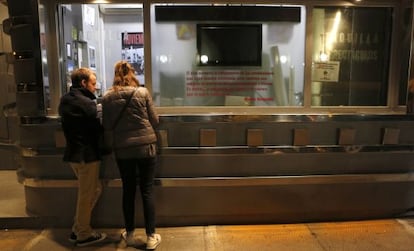Spanish courts probing suspected multi-million film subsidies fraud
Culture Ministry report says theaters falsified ticket sales to allow movies to receive funds

Four Madrid courts are simultaneously investigating evidence of an alleged subsidies fraud within the Spanish film industry.
The probe is focusing on state financing granted by the Culture Ministry to Spanish movie productions, according to a ministry report to which EL PAÍS has had access.
Investigators suspect that several theaters have been routinely exaggerating their ticket sales in order to help films qualify for funds of up to €1.5 million that are meant to help the homegrown movie industry.
In 2012 alone ministry workers were suspicious about box-office figures claimed by theaters for 38 of the 74 movies that applied for grants
The report, which has been sent along to prosecutors, shows that in 2012 alone ministry workers had suspicions about box-office figures claimed by theaters for 38 of the 74 movies that had applied for grants.
The precise amount of the fraud, which affects producers, distributors and theater operators alike, has not yet been established, but legal sources said it could be high, given that the regulations that gave rise to it have been in place for years.
The rules establishing the criteria for receiving subsidies had already been criticized by the industry itself in the past.
Under these regulations, the Culture Ministry awards money based on how much was invested in a Spanish production, how much it made at the box office, and how many people went to see it.
“In order to be eligible, you need at least 60,000 spectators, or 30,000 if the film was shot in a language other than Spanish,” explained José Manuel Bernabé, a former secretary general of the Institute of Cinematography and Audiovisual Arts (ICAA), the ministry agency that oversees the aid program.
Movie theaters have the obligation to inform the ICAA about box office takings and attendance figures.
Investigators believe that the altered figures were not just the result of isolated action by movie theater owners.
“There is preliminary evidence that it is a concerted practice [by theaters, producers and distributors],” says the ICAA report, which was sent to Madrid Attorney José Javier Polo.
The movies under suspicion include some produced by Enrique Cerezo, who is also president of Atlético Madrid soccer club, and José Frade. Cerezo has told EL PAÍS that he has not been informed, nor has any knowledge about, anomalous figures concerning his movies. Meanwhile, Frade declined to comment.
Alleged collusion
The ministry report states that many theaters inflate their box office figures in order to secure government subsidies. But the fact that the aid goes to film producers rather than theater operators, has given rise to the theory that different sections of the industry may have colluded in the scheme.
The existence of the alleged fraud led the government to change the eligibility criteria last summer through a reform to the 2007 Film Law.
Starting in January 2016, grants will be handed out as production progresses, rather than after the movie’s theatrical release.
Three Madrid courts are conducting investigations into the theater operators Luna Exhibición, AbacoCine and Séptimo Arte. A fourth case is also open, but the defendants have agreed to return the money and accept a more lenient sentence.
The investigation is based on surprise inspections carried out in 2012 at specific movie theaters, where irregularities were found. According to the report, the producer occasionally ordered the distributor to purchase tickets to a movie in order to reach the eligibility quota.
In 2012, the ICAA asked dozens of movie theaters to provide documentary evidence of the figures they had filed, including accounting information and bank transactions. Many did, while some sent in incomplete data, and a few did not respond at all.
On September 9 of that year, the agency warned the latter that it would subtract all attendance figures that did not have documentary backing, and that subsidies could be lost.
In late October, the ICAA concluded that question marks remained over 38 films of the 74 that applied for grants in 2012, and that 228 movie theaters were involved in irregularities.
Ultimately, the ICAA acted against 12 movies, while the remainder received their grant “given the impossibility of fully investigating whether the information provided was correct.”
English version by Susana Urra.







































